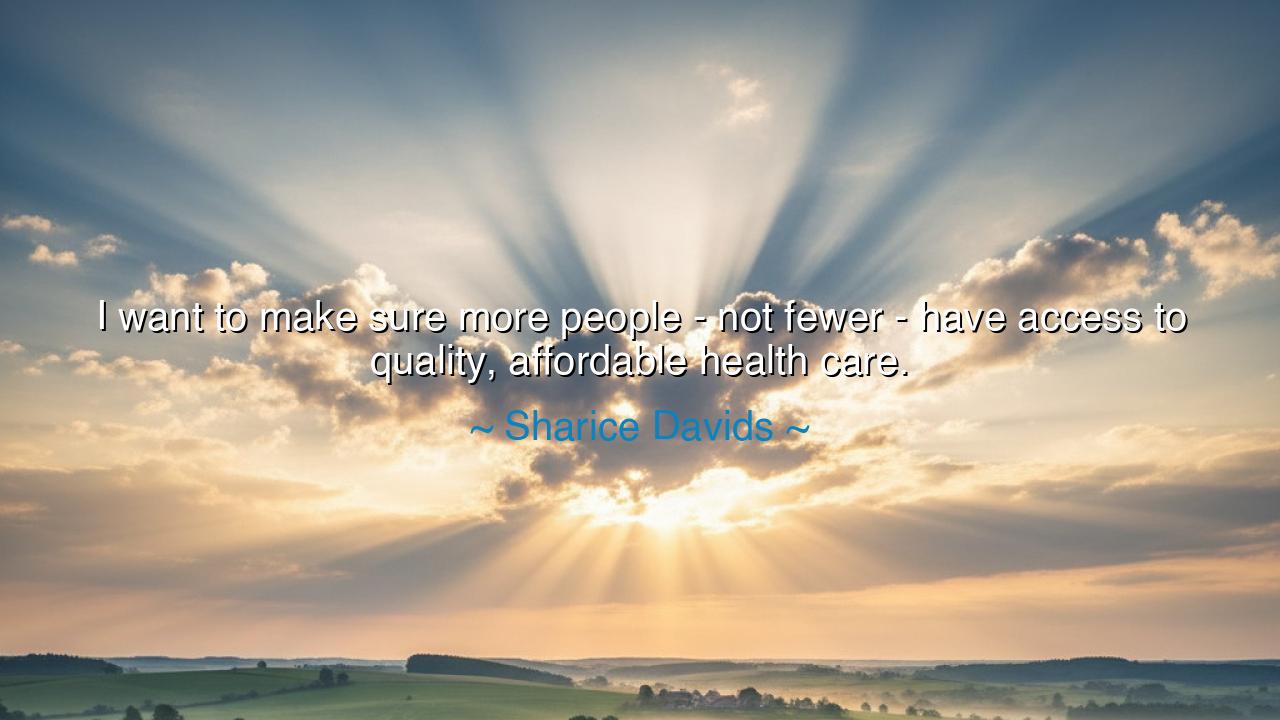
I want to make sure more people - not fewer - have access to
I want to make sure more people - not fewer - have access to quality, affordable health care.






“I want to make sure more people — not fewer — have access to quality, affordable health care.” These words of Sharice Davids, a modern leader and servant of the people, speak with the timeless voice of compassion and justice. They are not mere political utterances, but a moral declaration — a vow that the blessings of health, which sustain life itself, should not be the privilege of the few but the right of all. In her words echoes the ancient wisdom that the strength of a nation is measured not by its wealth or its armies, but by the well-being of its people.
In every age, the wise have known that health is the foundation of freedom. A sick and suffering people cannot rise to their potential; a community burdened by illness cannot labor, dream, or build. Thus, when Davids speaks of making health care accessible, she touches the heart of what it means to be human: to care for one another, to lift the weak, and to ensure that no soul is left to suffer in silence. For she understands what the ancients taught — that compassion is not weakness, but strength; that a society that abandons its sick has already begun to decay from within.
Long before the hospitals and medicines of our time, this truth was known among the healers of old. In the temples of Asclepius in Greece, the sick were tended not as burdens but as sacred guests. The priests of healing believed that to cure one man was to heal part of the world. Similarly, in the distant lands of India, the physicians of Ayurveda treated even the poorest with reverence, for they believed that the divine lived within every being. So too does Sharice Davids speak in the spirit of these ancient healers — she calls us back to that forgotten reverence, reminding us that to heal others is to honor life itself.
Consider also the story of Florence Nightingale, who, amid the filth and suffering of the Crimean War, devoted herself to the wounded. She did not ask for rank, race, or reward — only that those in pain should not be abandoned. Her lamp became a beacon in the darkness, symbolizing mercy in a world torn by greed and conflict. She, like Davids, understood that the true power of a nation lies not in conquest but in care. And from her example, we learn that to expand the circle of compassion — to bring healing to more souls — is the highest calling of leadership.
Davids’ words also bear witness to a struggle that spans generations. The question of who deserves health care — of who is “worthy” to be healed — has divided societies and revealed their deepest values. In every era, there have been those who would hoard the gifts of medicine, guarding them as treasures of privilege. Yet history has shown that when healing is withheld, suffering multiplies — and when healing is shared, prosperity follows. To expand access to care is not merely an act of charity; it is an act of wisdom. It strengthens families, restores dignity, and ensures that the next generation is born into a world that values life over wealth.
There is also a deeper layer within Davids’ message — the moral responsibility of empathy. In her words, “more people — not fewer,” lies a rebuke to indifference. It is easy to turn away from the suffering of strangers, to imagine that another’s pain is not our concern. But she reminds us that society itself is a living body, and when one limb suffers, the whole is weakened. To care for the sick, then, is not merely to show kindness; it is to preserve the vitality of our shared humanity. The ancients would call this balance Eunomia, the harmony of a just order — when every part of the community is tended and valued.
Therefore, O children of this age, let this be your guiding lesson: do not measure health by privilege, but by compassion. Work for a world in which the healer’s hand reaches all who need it, not only those who can afford it. Support systems that protect the vulnerable, for in doing so, you strengthen the very soul of your nation. And when you see suffering, do not look away — for every act of healing, every word of care, every policy that brings medicine to those in need is a victory for life itself.
Thus, the words of Sharice Davids become not just a statement of policy, but a call to the conscience of humankind. They ask us to rise above selfishness and remember the sacred duty that binds us together: to care, to heal, to ensure that every man, woman, and child — rich or poor, strong or weak — may walk this earth in dignity and health. For when healing flows freely through the land, when mercy becomes stronger than money, then will we truly be a civilized people — whole not only in body, but in spirit and heart alike.






AAdministratorAdministrator
Welcome, honored guests. Please leave a comment, we will respond soon